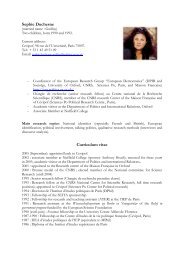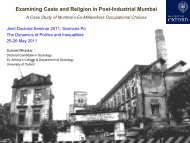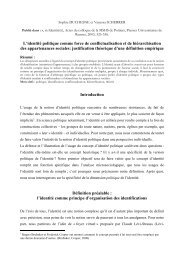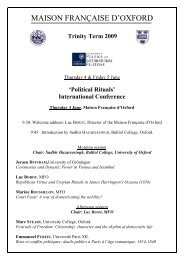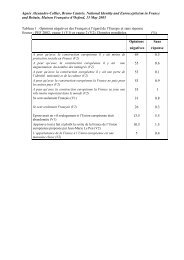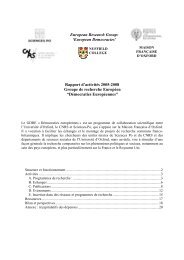european studies centre - The Oxford-Sciences Po Research Group ...
european studies centre - The Oxford-Sciences Po Research Group ...
european studies centre - The Oxford-Sciences Po Research Group ...
You also want an ePaper? Increase the reach of your titles
YUMPU automatically turns print PDFs into web optimized ePapers that Google loves.
European power in a multipolar system: How does Europe project its values,<br />
policies and standards?<br />
Lord Michael Jay of Ewelme, House of Lords<br />
Laurence Whitehead, Official Fellow in <strong>Po</strong>litics, Nuffield College, <strong>Oxford</strong><br />
Michael Jay followed up on Leonard’s challenge by elaborating how Europe could adapt<br />
to the changing conditions. He emphasized that the values espoused and projected are<br />
those in the preamble of the Treaty of Rome: rule of law, democracy, human rights. He<br />
then, based on his long-standing experience in the international arena, developed upon<br />
how others see the EU. According to him, it is a mixed picture, depending on who you<br />
talk to and what they see us doing. In Washington, the EU has low visibility as such,<br />
except on trade issues where the EU causes irritation, but of course high visibility of the<br />
member states and no visibility of EU as such outside DC. In Asia, the EU is still<br />
recognized as trading power, but also seen as an aging, uncompetitive economic bloc.<br />
Often, countries from that region, as well as Gulf States, are interested in Europe’s role in<br />
conflict resolution—regional groupings helping to resolve sub-regional conflicts.<br />
Jay furthermore argued that increased economic competitiveness of the EU is essential<br />
for its continued ability to project its values abroad.<br />
Laurence Whitehead elaborated on the intriguing question why the EU’s non-coercive<br />
approach worked better in Central America than in the Balkans. In the San Jose process,<br />
the EU projected its values in a non-coercive way, it applied in its policies the principles<br />
the EU is standing for and its willingness to stand by and support the transition towards<br />
democracy. He then described how the ACP – EU relation projects on the ACP countries<br />
what the EU is, e.g. how the EU Commission interacts with the ACP secretariat, despite<br />
the low legitimacy and accountability of the ACP secretariat.<br />
Finally, he highlighted that policies within the EU are as important as external policies,<br />
for example immigration policy and its consequences on how non-Europeans perceive<br />
the EU.<br />
General overview of the debate<br />
<strong>The</strong> challenge the project faces is to understand Europe in the light of what others look<br />
for. We cannot seriously understand what we are standing for if we do not compare it to<br />
what others stand for. If we follow the trend of describing our values/norms as driven by<br />
“good” and that others have to comply –the risk is high of replicating European policies<br />
of the 19 th century.<br />
Furthermore, “inside” and “outside” have become increasingly blurred because<br />
globalization challenged the disctinction between internal and external policies as well as<br />
their meaning for different actors.<br />
4



